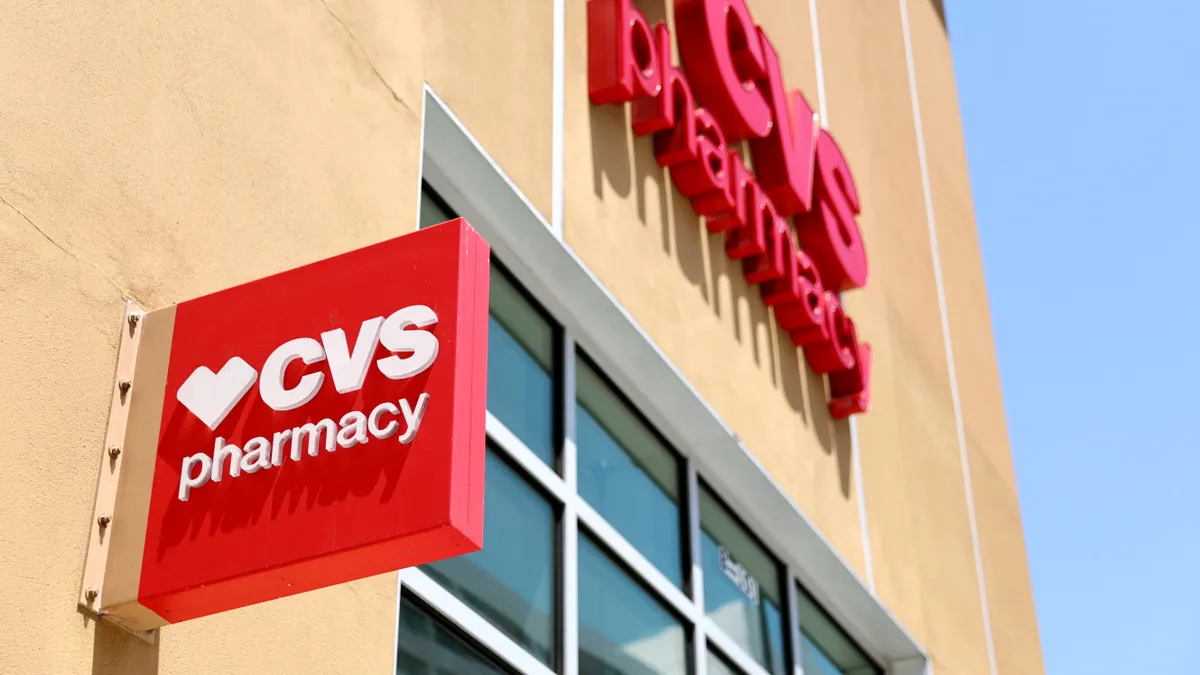Dive Brief:
- CVS has overhauled how its pharmacies are paid by commercial payers, after successfully converting contracts with pharmacy benefit managers over to a novel reimbursement model for 2025.
- Now, all commercial prescriptions dispensed at CVS pharmacies will be reimbursed the cost of the drug, plus a set markup and additional pharmacist fee for handling and dispensing the medication, the healthcare conglomerate announced this week.
- The “cost plus” model, called CostVantage, should result in more reliable revenue for CVS’ 9,000 retail pharmacies, according to the Rhode Island-based company. CVS is already eyeing an expansion of CostVantage to Medicare and Medicaid managed prescriptions.
Dive Insight:
CVS announced CostVantage in late 2023 as its pharmacies struggled with flatlining payment for dispensing drugs.
The company blamed an antiquated reimbursement model that led pharmacies to use higher rates on some medicines to subsidize losses on others, a strategy that’s been less than effective in recent years as the cost of branded drugs rises and reimbursement from payers falls.
Without the pricing change, CVS’ retail pharmacy division expected a 5% drop in adjusted operating income this year. CostVantage should help hike the business’ margins to flat, CVS executive Prem Shah said during the 2023 investor day unveiling CostVantage. Shah, now executive vice president and group president of CVS, was the company’s chief pharmacy officer at the time.
The transition to CostVantage marks a significant shift in how many people in the U.S. get their medications, as the majority of Americans are covered by employer-sponsored plans. CVS’ contracts with commercial payers account for some 750 million prescriptions annually, according to the company.
Though the company says the model will not increase the cost of drugs, some experts have said that how CVS calculates the acquisition cost of drugs, and how it negotiates mark-ups with payers, could allow the company to manipulate the model.
In comparison, Cost Plus Drug Company, the transparent online pharmacy created by billionaire Mark Cuban, charges a flat 15% markup in addition to the cost of drugs, plus pharmacy fees.
CVS started rolling out the model in 2024, with hopes of launching for all commercial prescriptions in 2025. However, by late last year CVS had yet to get all its clients on board. Some market watchers questioned whether PBMs, middlemen that pay pharmacies for dispensing medication on behalf of insurers, would accept the arrangement, as it could be less profitable for them.
By November, the company had signed about half of its clients to the new model, Shah said during a third-quarter earnings call with investors.
The major holdouts were the two largest PBMs besides CVS Caremark: UnitedHealth-owned Optum Rx and Cigna-owned Express Scripts, according to CVS CFO Tom Cowhey.
However, it’s normal for contracting discussions to stretch late into the year, Cowhey said during a November healthcare conference hosted by investment research firm Wolfe.
“I wouldn’t read into the fact that we don’t have a signed contract on some of those,” Cowhey said, later adding: “We’re losing money on some of the generics we file, and we’re losing money on pretty much every branded prescription that we fill. And so, part of that advantage of CostVantage is that we will level the playing field.”
PBMs may have been more willing to accept CostVantage as a way to offset future political and regulatory scrutiny, TD Cowen analyst Charles Rhyee wrote in a note on Monday.
PBMs had a financially rich but politically bruising 2024, emerging as public enemy No. 1 in the fight over who to blame for skyrocketing drug costs. Executives for Caremark, Express Scripts and Optum Rx — the “Big Three” PBMs, jointly accounting for 80% of all U.S. prescriptions — were summoned before Congress to testify about how their business practices could be raising the price of medications while putting independent pharmacies out of business.
PBMs also got a healthy dose of criticism from states and antitrust regulators — including a scathing report from the Federal Trade Commission. This all culminated in a September lawsuit from the FTC against Caremark, Express Scripts and Optum Rx over how their negotiations with drugmakers may have artificially inflated the cost of insulin.
And in December, a bipartisan group of lawmakers unveiled legislation that would break up PBMs by forcing them to divest pharmacy assets, a proposal that would be devastating for CVS (though it’s unlikely to pass).
Amid the turmoil, PBMs have launched a number of new products they bill as transparent and cost-effective.
Along with CVS’ CostVantage, the company in 2023 also announced a new PBM model that’s based on the net cost of drugs, with clear administrative fees. Express Scripts and Optum Rx have rolled out their own transparent PBM models, as data shows employer and payer clients, fed up with the black box of pharmacy contracts, are increasingly interested in the offerings.
CVS is also not the only major pharmacy chain looking to stabilize reimbursement. Beleaguered Walgreens is also aggressively pushing for higher compensation for pharmacy services, according to Rhyee’s note.
PBMs’ willingness to convert their contracts to a cost-plus model “may indicate that [Walgreens] may see improved pharmacy reimbursement pressure in 2025,” Rhyee said.








